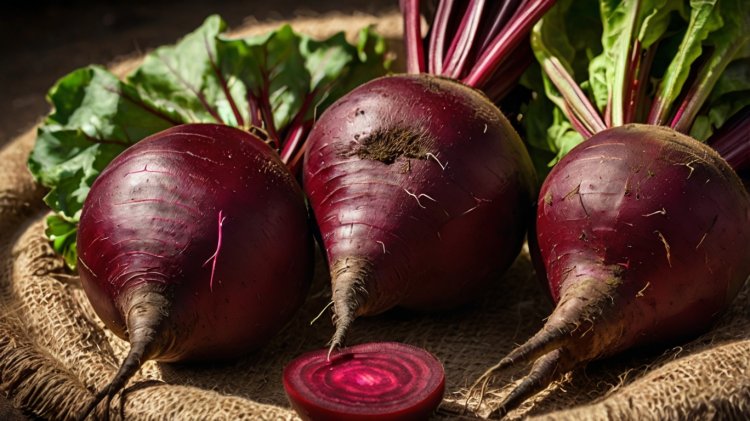12 Amazing Health Benefits of Beetroots
Discover the top health benefits of beets, a nutritional powerhouse packed with vitamins, minerals, and antioxidants. Learn how beets support heart health, brain function, athletic performance, and more, along with tips for adding them to your diet.

Top 12 Health Benefits of Beets: A Nutritional Powerhouse
Introduction
Beets, often hailed as a superfood, are not just a colorful addition to your plate but a nutrient-packed vegetable with numerous health benefits. Whether you roast them, juice them, or enjoy them in salads, beets offer a versatile way to boost your overall health. This article combines the latest insights into the health benefits of beets to provide a comprehensive look at why they deserve a spot in your diet.
1. Rich in Essential Nutrients
Beets are low in calories and high in essential vitamins and minerals. A 100-gram serving of boiled beets provides:
-
44 calories
-
2 grams of fiber
-
20% of the daily value (DV) of folate
-
14% DV of manganese
-
Other key nutrients like potassium, copper, and vitamin C.
These nutrients support growth, heart health, and overall bodily functions.
2. May Help Lower Blood Pressure
Beets contain nitrates, which the body converts into nitric oxide. This compound helps relax blood vessels and improve blood flow, potentially lowering blood pressure and reducing the risk of heart disease and stroke. Studies show regular beet consumption can significantly benefit systolic and diastolic blood pressure levels.
3. Boosts Athletic Performance
Nitrates in beets enhance mitochondrial efficiency, improving oxygen usage during exercise. Studies suggest drinking beet juice 2-3 hours before training boosts endurance, increases time to exhaustion, and improves athletic performance.
4. Powerful Anti-Inflammatory Properties
Beets contain betalains, natural pigments with antioxidant and anti-inflammatory properties. These compounds may help reduce markers of chronic inflammation associated with conditions like obesity, heart disease, and arthritis.
5. Supports Digestive Health
With 3.4 grams of fiber per cup, beets promote regular bowel movements and support gut health. Fiber feeds beneficial gut bacteria, reducing the risk of digestive conditions like diverticulitis and colon cancer.
6. Enhances Brain Function
Nitrates in beets improve blood flow to the brain, particularly the frontal lobe, which is responsible for decision-making and memory. Studies have shown that beet juice consumption enhances cognitive function and reaction times, especially in older adults.
7. Potential Anti-Cancer Effects
Beets contain cancer-fighting compounds like betaine, ferulic acid, and rutin. While more human studies are needed, test-tube research suggests beetroot extract may slow the growth of cancer cells.
8. Balances Energy Intake
Beets are low in calories but high in fiber and water, making them a filling addition to any meal. Their high nutrient density helps balance energy intake and supports weight management.
9. Improves Heart Health
Beets’ high folate and nitrate content contribute to better heart health. Folate supports cardiovascular function, while nitrates improve circulation and reduce arterial stiffness.
10. May Relieve Menopause Symptoms
Post-menopausal women may benefit from the nitrates in beets, which support arterial flexibility and cardiovascular health. Drinking beet juice before exercise can also improve mobility and metabolic outcomes.
11. Supports Skin and Hair Health
Beets are rich in vitamin C and antioxidants, which support collagen production and combat oxidative stress, improving skin elasticity and promoting healthy hair growth.
12. Versatile and Delicious
Beets can be enjoyed in various ways, from salads and soups to juices and dips. Cooking methods like roasting or steaming help retain their nutrient content, while beet greens offer a spinach-like alternative packed with additional vitamins.
Tips for Adding Beets to Your Diet
-
Juice: Combine beets with carrots, apples, and ginger for a refreshing drink.
-
Salads: Grate raw beets into coleslaw or mix with oranges and walnuts.
-
Roasted: Toss beet wedges with olive oil and roast for a flavorful side dish.
-
Soups: Try classic borscht or beetroot tomato soup for a hearty meal.
-
Dips: Blend beets with yogurt and garlic for a vibrant, healthy dip.
Conclusion
Beets are a nutritional powerhouse, offering numerous benefits for heart health, brain function, athletic performance, and more. Their versatility makes them an easy addition to any diet. Whether you’re aiming to boost your energy, enhance recovery, or support overall well-being, beets are a simple yet powerful choice.
FAQs
1. Can I eat beets daily?
Yes, eating beets daily in moderate amounts is generally safe and beneficial, but excessive consumption may cause side effects like beeturia or digestive discomfort.
2. Are beets good for diabetics?
Beets have a low glycemic load and are rich in fiber, making them a healthy choice for managing blood sugar levels.
3. What is the best way to consume beets?
Juicing, roasting, or enjoying them raw in salads helps retain their nutrients. Avoid boiling to preserve nitrates.
4. Can beets improve sexual health?
Beets may enhance nitric oxide production, which improves blood flow and could support sexual function.
5. Are beet greens edible?
Yes, beet greens are rich in nutrients and can be cooked or used as a spinach substitute.










